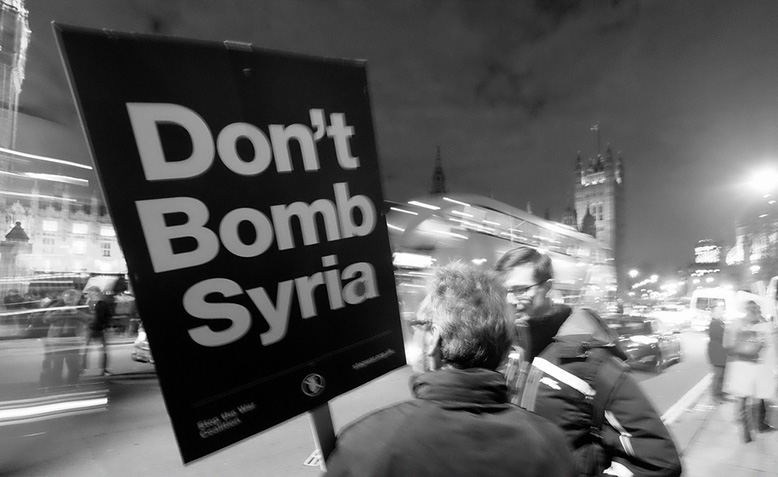 Protestors outside parliament, demonstrating oppostion to war in Syria: December 2015. Photo: Alisdare Hickson / Flickr
Protestors outside parliament, demonstrating oppostion to war in Syria: December 2015. Photo: Alisdare Hickson / Flickr
As many push for escalation in Syria, Chris Nineham takes a look at why this is a bad idea
Efforts to push for military escalation in Syria have run into trouble. Last week, at the same time as demanding protests outside the Russian Embassy, foreign secretary Boris Johnson claimed that moves towards negotiations with Russia over Syria had ‘run out of road’ and that ‘more kinetic options’ needed to be considered. In other words more war.
The Financial Times concurred. In an editorial earlier this week it called on Western governments to toughen up with on Russia, and though it recognised risks with a no-fly zone, it argued they may be risks worth taking:
‘Enforcing a no-fly zone was always a risky proposition that could have sucked Washington into a war for which there was no obvious political endgame. It is even more difficult to envisage a no-fly zone now that Russia has installed anti-aircraft weapons. Any attempt to do so would risk a direct military confrontation with Russia. But if the slaughter does not stop in the near future, a no-fly zone will have to be considered again.’
Despite the growing clamour, those of us who oppose all foreign interventions in Syria have been making some headway. A British poll over the weekend found that, for all the the mounting calls for more intervention, 40% opposed a no-fly zone as against only 30% who were in favour. There seems to be a growing understanding that implementing a no-fly zone actually means policing Syrian airspace with Western planes, shooting down any hostile fighters and bombing Syrian and Russian anti-aircraft positions. Such an attack on Assad’s forces was explicitly ruled out when parliament voted against it in 2013. The leak of Hilary Clinton’s 2013 speech explaining that a no-fly zone would mean ‘killing lots of Syrians’ won’t have helped those pushing for one, nor will the more and more obvious fact that it would risk confrontation with Russia.
The west’s support for Saudi Arabia’s war on Yemen makes a mockery of its claims to be playing a humanitarian role in the region. The United States been central to the the Saudi-led campaign that has killed more than 6,800 people, displaced 2.8 million and caused a catastrophic food shortage there. Despite attempts to conceal it, British involvement in the campaign has recently become clearer. Leaving aside massive arms supplies to the Saudi, recent reports suggest that British special forces are involved in training Yemeni troops and helping Saudi forces co-ordinate bomb and drone strikes in Yemen.
The fact that US and British forces are now engaged in an onslaught on Iraq’s second city Mosul only adds to the sense of confusion at the heart of Western policy in the Middle East. The assault looks set to be long and bitter with every chance of creating a mass exodus and another humanitarian catastrophe. Unlike Boris Johnson, Ann Clywd, John Woodcock and the others advocating escalation in Syria, Stop the War is calling for an end to all the foreign interventions in the region. We believe that more bombing can only entrench conflict and bring more misery to people already suffering from years of war.
While opposition to escalation here is good news, it would be wrong to be complacent. Despite Clinton’s behind-closed-doors assessment in 2013, both the main candidates in the alarming US election are publicly in favour of a no-fly zone in Syria, and Clinton is so hawkish it is said she terrifies the generals. Meanwhile the FT editorial shows that pro-intervention opinion here is not limited to the inveterate warmonger fringe or our doltish foreign secretary. In the weeks and months ahead we will need to do everything possible to strengthen the movement against more war.

